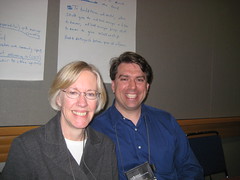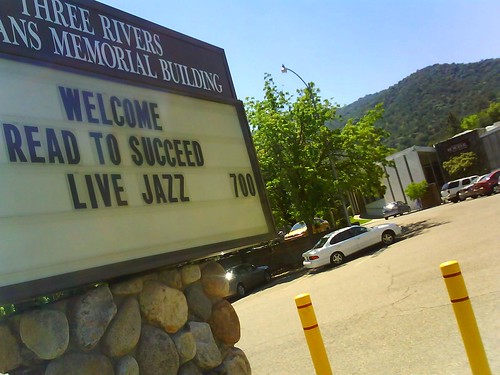There is a great post by Meredith Farkas about healthy workplaces. This, in part, was inspired by a recent post over at
Library Garden about why people leave?There are several categories in the Library Garden post that discuss why people leave their jobs:
Pay-
Vacation and/or Holidays-
Hours and/or Nights-
Professional Investment-
Advancement-
To which I commented:
PayThe system should be performing an annual compensation and classification study. This will ensure that pay is equitable. If you are not doing that, you can't complain that people are leaving for better pay. I had someone leave from a part-time to a full time in another county. That one is tough because it wasn't in the comp and class realm, but most of the people who work for me get the same pay as any other library in Arizona. Librarians make 41K same as Chandler, Arizona, Mariciopa County, etc.
HoursThis is a common complaint and the burden of nights and weekends should be shared. How can one say one should do more than another? In some systems, everybody wants to work a night or a weekend and it works better for everyone. If one is unfairly taxed, that is a reason to leave, but if you do it along with everyone else, there is not much to say about that. If everyone is committing equally and there are problems, it may need a review of hours of operation.
Professional investmentEvery library should have a training budget. It should allow as many library staff as possible to go to training, explore their interests, and pay for their trips to conferences etc. Most libraries can only afford to send a few people, and then only higher up, if it can be opened up to everyone, the results are interesting.
AdvancementThis one is the toughest. Most libraries are fairly flat institutions. They allow pay increases and there is some room for advancement, but not substatial. This has been an issue for me in the last three months. I lost a library assistant to a bigger system with more pay, I lost a librarian to become a library director in a neighboring town, and a I lost a senior library assistant who became a youth librarian in another neighboring city. There is no room for advancement at my small one library system. The only choice is to go to neighboring communities. It will change, but slowly. In the meantime, I will bleed because of it.
Meredith poses several questions from the book
First, Break All the Rules. She repeats 12 questions from the book. I replied to them in her comments and am re-posting it here:
“1. Do I know what is expected of me at work?
Yes because we issue job duties not job descriptions. It breaks all duties down and details percentage of time. There is flexibility, but it provides the general idea.
2. Do I have the materials and equipment I need to do my work right?
I always leave extra cash in the budget plus I ask staff what they need around budget time. I also have a Friends wish list that staff contribute to.
3. At work, do I have the opportunity to do what I do best every day?
Job positions are not static. One person cannot do the same as another and it is better to mold that position towards the person’s desire. If they like providing programming instead of cataloging, I would configure it as much as I can to make it work. Sometimes there is flexibility, sometimes not.
4. In the last seven days, have I received recognition or praise for good work?
I always do a manager walk around and complement staff on a job well done. I need to do more of that. Previously, I provided an employee of the month program so that staff would be recognized for good work and what they did that was so good. It has taken a brief hiatus. I will find an alternative.
5. Does my supervisor, or someone at work, seem to care about me as a person?
Personal time is very important to me. If someone is going through something personally, they won’t be very happy at their jobs. It is better to extend as much leeway as possible so that they can resolve an issue. I once had a staff member needing to take three weeks off in a few days to go see their dying mother. I let them take it and use it as sick time. This was a total violation of policy, but the person was able to get there before their mother died. A few days later, she wouldn’t have made it.
6. Is there someone at work who encourages my development?
I hope I provide enough encouragement for training and professional development. It is difficult because most of the training is in the valley, a 30 mile drive, so many are reluctant to go on their own. I put out a training program so that they can request any training they want and attend any conferences they want regardless of their status.
7. At work, do my opinions seem to count?
Meetings are usually feedback meetings. What is going on and what do we need to do about it? Do we need to adjust anything. Front line staff opinion is critical. If they aren’t providing honest feedback, I can’t make good decisions.
8. Does the mission/purpose of my company make me feel like my work is important?
My library has a strategic plan and each staff members role is molded around providing active parts of the plan or support parts. I came up with a graph that represents each staff members role and displayed it.
9. Are my co-workers committed to doing quality work?
This wasn’t always the case, but with some training and some people leaving, everyone works more as a team.
10. Do I have a best friend at work?
I think that is established through after work programs. Some staff members set-up bowling after work or other events. Outside of work events help with this.
11. In the last six months, have I talked with someone about my progress?
Everybody gets a review from their supervisor. However, it is important that there is a constant discussion about expectations and mission. If you are just doing a review every six months, you may be missing the day to day stuff. It also minimizes surprises at the review bad or good. No one should be surprised if I think they are doing a good job.
12. At work, have I had the opportunities to learn and grow?”
This goes back to providing training opportunities both inside and outside of work. The library provides regular training and elective training. Staff are allowed to attend conferences and programs. Most of them can only go in state right now. Some can go to national conferences. It is tough to afford anything out of state.
Finally, I will point something I read on
Tom Peters blog about morale:
Top 50 Have yous?SNIP
Have you thanked a front-line employee for a small act of helpfulness ... in the last three days?
Have you thanked a front-line employee for a small act of helpfulness ... in the last three
hours?
Have you thanked a frontline employee for carrying around a great
attitude ... today?
END SNIP
I would say the solution to all of these posts are the simple words thank you. I am surprised that in other organizations, people get so gaga over thank you. It shouldn't be this way. people should know they are doing a good job. There is a great point over at
Slow Leadership about this issue:
SNIP
Gratitude isn’t just a pleasant trait, it’s also a very powerful one.
Thanking others and recognizing how much we all depend on support and co-operation makes it far more likely that help will be there when you need it. Those who help others most freely are most likely to be helped in their turn—provided that gratitude as recognized for what it is: a major constituent in the glue that holds together groups of all sizes, from a few friends to society as a whole.
END SNIP
I would say if you want to improve morale, the best thing to do is to say thank you. It is a rare commodity these days.
 I often tell people that I am a big believer in the magic of
libraries. They provide inspiration and hope, no matter their size. Today,
libraries can be everywhere. From the massive buildings that dominate a downtown landscape,
to the small branches in malls where people shop, book machines on the walk home from school, and
even on your smartphone, libraries are there. The biggest challenge is getting
this message across. How do we find ways to tell this story to the local
community? To get people excited about it, and ultimately change their
perception and gain their support? I believe it is in this magic that we can spread that message.
This misconception is an opportunity to surprise and delight. It’s our own
shock and awe, and we can deliver that to our communities.
I often tell people that I am a big believer in the magic of
libraries. They provide inspiration and hope, no matter their size. Today,
libraries can be everywhere. From the massive buildings that dominate a downtown landscape,
to the small branches in malls where people shop, book machines on the walk home from school, and
even on your smartphone, libraries are there. The biggest challenge is getting
this message across. How do we find ways to tell this story to the local
community? To get people excited about it, and ultimately change their
perception and gain their support? I believe it is in this magic that we can spread that message.
This misconception is an opportunity to surprise and delight. It’s our own
shock and awe, and we can deliver that to our communities. One of the key principles to this process is a motto from
our Foundation: Your Library in More Places. The concept came up on a sort of
whim. I have written a regular feature for the local paper about our library
for several years. One of these articles was titled "Your Library in More Places." In this article, I discussed our book machine services and our efforts in renovating our libraries.
One of the key principles to this process is a motto from
our Foundation: Your Library in More Places. The concept came up on a sort of
whim. I have written a regular feature for the local paper about our library
for several years. One of these articles was titled "Your Library in More Places." In this article, I discussed our book machine services and our efforts in renovating our libraries. Book machines are the easiest and cheapest way for libraries
to provide books and materials on a 24/7 basis in a remote location. We've provided these machines outside of schools, inside job
centers, but most importantly, where books are simply not available. A lot of
discussion today has been about how to get children school ready, as well as how to ensure children read at a third grade reading level by the third grade.
Access to books is a key feature to that effort. There is much buzz about projects
such as Little Free Libraries, but this alone doesn't address the problem of getting books
into a community in the first place, especially in small rural towns. These
machines provide 300 books to children on a 24/7 basis. They get such heavy use
that we need to send staff out several times a week, just to replenish the
machine. Most of these areas are without any resources and have no access to
books or a library. Some of their schools do not even have libraries. It is in
this way that we can provide the key ingredient to literacy, and in a way that has the
greatest amount of access.
Book machines are the easiest and cheapest way for libraries
to provide books and materials on a 24/7 basis in a remote location. We've provided these machines outside of schools, inside job
centers, but most importantly, where books are simply not available. A lot of
discussion today has been about how to get children school ready, as well as how to ensure children read at a third grade reading level by the third grade.
Access to books is a key feature to that effort. There is much buzz about projects
such as Little Free Libraries, but this alone doesn't address the problem of getting books
into a community in the first place, especially in small rural towns. These
machines provide 300 books to children on a 24/7 basis. They get such heavy use
that we need to send staff out several times a week, just to replenish the
machine. Most of these areas are without any resources and have no access to
books or a library. Some of their schools do not even have libraries. It is in
this way that we can provide the key ingredient to literacy, and in a way that has the
greatest amount of access. It's also important to keep ahead of national technology trends and apply them to local community needs. E-books, digital maker spaces, and other technology are key pieces to the library's immediate future. Throughout a community, if someone looks at their smartphone for information, a library app can be there, complete with e-books, magazines, videos, reference materials and research. Even tutoring help is available! Now more than ever, libraries have the tools to show up in unexpected places and demonstrate their value.
It's also important to keep ahead of national technology trends and apply them to local community needs. E-books, digital maker spaces, and other technology are key pieces to the library's immediate future. Throughout a community, if someone looks at their smartphone for information, a library app can be there, complete with e-books, magazines, videos, reference materials and research. Even tutoring help is available! Now more than ever, libraries have the tools to show up in unexpected places and demonstrate their value.






![Reblog this post [with Zemanta]](http://img.zemanta.com/reblog_e.png?x-id=4c753d5d-c7ca-49e2-a071-aa8dbff92f0f)



![Reblog this post [with Zemanta]](http://img.zemanta.com/reblog_e.png?x-id=940722a0-9460-413e-aecf-166bf76a91c8)



